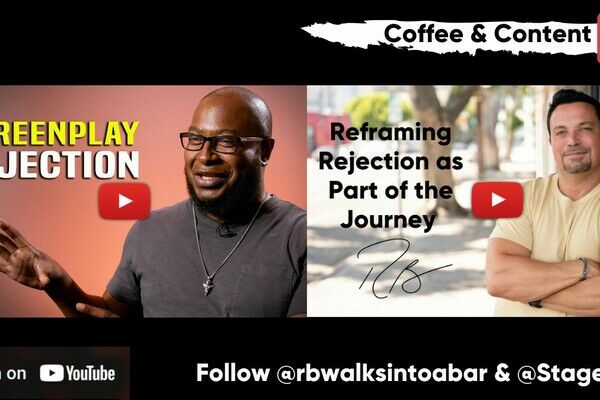5 Reasons Why Your Script's Second Act Fails
I always chuckle when I read a query letter from a writer saying they have included the first 10 pages of their screenplay because I’ll “be so hooked by the first 10 pages,” I will certainly request the whole thing. I laugh because it’s not the first 10 pages of a screenplay that concern the reader - it is everything from Page 30 to 75 that we focus on.
Arguably, writing the first 10 pages of a screenplay is not terribly difficult to write. The writer is simply setting up his character and the world; essentially setting the table for the narrative. When the writer attempts to change that world and set his character on a journey, that is when the narrative usually breaks down. Not in the first 10 pages.
There are a number of reasons why screenplays crash and burn, but most problems can be traced back to the writer not knowing what his character ultimately wants. If the writer does not present a specific goal, which his protagonist can articulate, he has already set himself up for failure.
The most common reasons why scripts receive the dreaded PASS, all result from your protagonist not having a clear goal. Let’s take a look at 5 of these reasons and ways to address them.
“The Story Begins Too Late”
Many scripts tend to spin their wheels without gaining any momentum. We see the character in his or her daily life, with very little changing for much of the first half of the project. When the story finally gains some steam, we have already lost interest in what our character is meant to be achieving.
To solve this problem, consider how you are setting up your character. What is the most efficient way of telling the audience who your character is, and what their world is like? We don’t need multiple scenes of brushing teeth or making dinner or driving to work. We get it, he has a routine. Let’s bust up that routine almost immediately. Force change into his world.
“Every Line Matters”
In a film, every piece of dialogue needs to serve a specific purpose. By the end of the project, there should be no wasted bullets in your gun. But even though every line matters, most writers either under-write or over-write dialogue, hoping their point is being communicated. Worse yet, even with all the dialogue in the script, the goal of the protagonist is never articulated in a clear, meaningful - albeit organic - way.
For instance, we all know why the Fellowship of the Ring was assembled: “The ring must be taken deep into Mordor and cast back into the fiery chasm from whence it came. One of you must do this.” Right away, we know what their mission is, and what we get to watch for the next 3 films is their execution of that mission.
Or, take one of my favorite films, in which Indiana Jones is set on a quest for the Ark of the Covenant: “I don't believe in magic, a lot of superstitious hocus pocus. I'm going after a find of incredible historical significance, you're talking about the boogie man.”
When writing your dialogue, be sure your characters articulate clear goals in such a way that we know our protagonist’s mission and the consequences should he or she fail. Every other line of dialogue from that point on is within the context of that journey.
“The Scenes Have No Meaningful Conflict”
Scenes tend to come and go, with no meaningful change to the characters or the narrative. In effect, the protagonist seems to be treading water, waiting for the story to happen to him. This robs your characters of any sense of purpose and makes them seem passive. Passive characters are not interesting to watch.
If you find your scenes are void of conflict, consider two things. First, does this scene need to be in the screenplay? If the answer is yes, then ask yourself, what can I do to inject conflict into this scene and create a complication for your character. If two characters are talking about the weather and Character A says, “It’s a beautiful day today,” and Character B agrees, there is not conflict. If, on the other hand, Character A says, “It’s a beautiful day today,” and Character B says, “You’re an idiot, this is the worst weather imaginable,” suddenly, we’ve given them something to argue about. A simple, frivolous, exchange that could escalate quite quickly, because your character has a goal; convincing the other their point of view is right.
Think of every scene as a mini-movie, with its own arc. Sometimes the arc will be in the protagonist’s favor but most of the time it will lead to increased complications.
“The Character Logic is Unclear”
Speaking to point of view, every character you write must have logical and explainable reasons for their behavior. Often times, I’ll find myself asking the question, “Wait, why is he doing this?” This is particularly true of antagonists, or “villains,” who often times are bad for the sake of being bad, rather than giving them a distinct point of view.
Remember, just as your protagonist has a goal, their antagonist has an equally important goal. So be sure to service it adequately.
Let’s look at one of the most iconic villains of all time, Darth Vader. From DV’s point of view, he is trying to keep order in a universe where there are multiple galaxies and rebels everywhere trying to undermine him. An emperor breathing down his neck. And now his son and his friends want to blow up his brand new Death Star. That’s a lot of pressure. No wonder he is so quick to squeeze the life out of some pipsqueak general.
Each character action needs a logical and consistent reason. Which, again, speaks to a goal which is able to be articulated by a protagonist, and an equally serviceable goal by the antagonist(s).
“The Plot is too Thin”
This is the only time you don’t want to be called ‘thin’ in Hollywood.
I know this has happened to you. Your friend desperately wants to tell you this really “funny” or “interesting” story. And what they end up telling you is some rambling, meandering story, with no real point or purpose. Now, if they know the old joke, once they realize the story is fairly pointless, they might end with “...and then I found $5.” It’s not really that funny, but it illustrates a point, if you’re struggling to tell an “interesting” story, chances are, it’s not that interesting. It’s probably a little thin.
So many times, scripts that should be 50 pages end up being stretched to 100, with meandering plot diversions, scenes that feel too long, or scenes that don’t drive the narrative forward. None of these devices fool the reader. Your story needs more substance.
If you’re feeling like your story is too thin, you should go back and look at the problem you have created for your character. Is it big enough that dramatic tension will continue to build as your character tries to solve the problem? If not, why not? Is it too easily solved? Is the solution too obvious and we’re waiting for the character to stumble onto it? If so, consider how to make your problem more complex. Or what complications your character needs to encounter which make it harder to complete his task. “The Dude” is perfectly happy to throw the money out the window of the car and end his encounter with Lebowski, Bunny, and the kidnappers. But instead, Walter throws them his dirty undies and complications escalate for The Dude.
If you found Jason's tips helpful, join him this Thursday, February 25, 2016 at 1pm PST for a LIVE Stage 32 Next Level Webinar "The Secret To Cracking Your Script's Second Act" - to learn more, click here!
About Jason Mirch:
Jason Mirch is a feature film and television producer and executive based in Los Angeles, California. Most recently, Mirch founded Destructo Productions and is currently producing a feature film based on the New York Time best-selling memoir Odd Man Out by Matt McCarthy.
Previously, Mirch was the head of feature and television development and production at Image Nation Abu Dhabi, a finance and production company based in The United Arab Emirates. There, Mirch was directly involved in developing Image Nation’s 5-year strategic plan with the CEO, Michael Garin.
Mirch worked closely with producers, Ashok Amritraj (Hyde Park Entertainment), Walter Parkes and Laurie MacDonald (Parkes+MacDonald), as well as Jonathan King (Participant Media), in the development, financing and production of a slate of international motion pictures, while supervising the content division for Image Nation International. There, he supervised the Image Nation contributions in the development of Flight, The Help, The Best Exotic Marigold Hotel, Contagion, Life of Crime, Ghost Rider 2, Midnight Sun, and 100 Foot Journey, among others.
Locally, Mirch supervised a team of executives to manage a slate of over 20 feature film and television projects in active development.
Prior to his work at Image Nation, Mirch was Co-Head of Development at Zadan/Meron Productions (Chicago, Footloose, The Bucket List) where he was actively involved in the development and sale of television series and mini-series to CBS, NBC, Fox, ABC, and Lifetime. He has also developed a slate of feature film projects for New Line, Paramount, Summit Ent., and CBS/Paramount.
Mirch has worked with partners based in the Abu Dhabi, Dubai, Jordan, Egypt, Saudi Arabia, and India. He has sold programming to the OSN Network, the largest satellite provider in the MENA region, as well as MBC, the largest network in the region. Additionally, Mirch has worked with Gulf Film and Empire, two of the largest theatrical distribution companies in the MENA region.
Mirch has worked with firms based in New York, London, Amsterdam, Hong Kong, Korea, and the Philippines to develop, produce, and distribute international content.
Mirch has also consulted a number of international firms on the Middle East market, advising companies such as the BBC, Creative Artists Agency, and Burberry.
Like this blog post? Please share it on social media (Facebook, Twitter, LinkedIn, email etc) by using social media buttons at the top of the blog. Or post to your personal blog and anywhere else you feel appropriate. Thank you.
As always, we welcome thoughts and remarks on ANY of the content above in the Comments section below...
| Tragedy On Set - Remembering Sarah Jones 2 Years Later |
| Setiquette - 16 Tips On How To Behave On A Film Set |
Search Stage 32 Blog
There are now 3681 blog posts for you to enjoy. Search them all by tags below.
Acting, Advice, Cinematography, Coffee & Content, Composing, Contests, Distribution, Featured, Filmmaking, Financing, Inspirational, Networking, Producing, Screenwriting, Success Stories, Tips, Trending,Relevant Tags
Recommended Articles

Coffee & Content: Reframing Rejection as Part of the Journey

Advice For Screenwriters From An Award-Winning Producer & Repped Screenwriter

Stage 32 Founder & CEO Richard "RB" Botto Featured in Grey Journal: Highlights From AFM 2024!

Red Carpet Roll-Out: December 2024's New Executives & Education at Stage 32!

Coffee & Content: Global Opportunities Are Increasing!

The Rise & Struggle of Independent Filmmakers: Sustaining Creativity in a Studio-Dominated World

Stage 32 Certification at Focus London 2024!

New Feature: Stage 32 Writers Are Now Spotlighted With Unique Badges!

6 Things To Know About Script Legal Research



